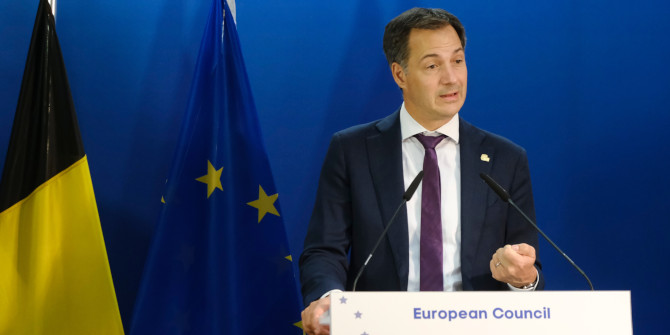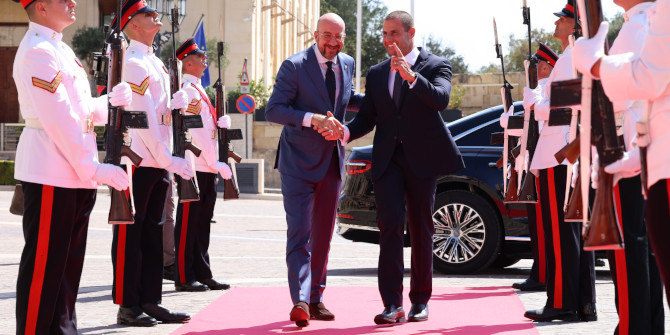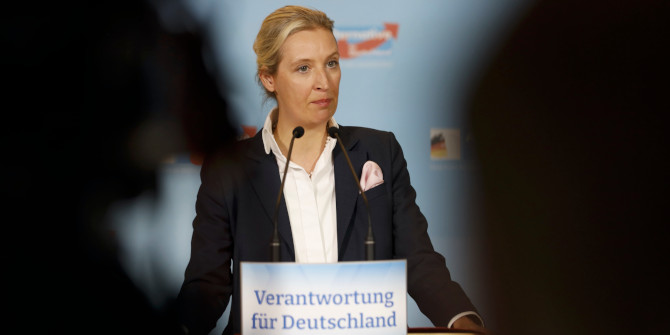Italian Prime Minister Giorgia Meloni led her Fratelli d’Italia party to first place in Italy’s European Parliament election. Gianluca Piccolino argues the result has set the stage for a clash over a contested constitutional reform bill introduced by Meloni’s government.
Some 20 months after the Italian right won a sweeping victory at the 2022 Italian general election, Italians have reaffirmed their preference for the country’s governing coalition at the 2024 European Parliament election. The parties of the coalition each increased their vote share compared to 2022.
As in 2022, the success of the coalition rested on Giorgia Meloni’s Fratelli d’Italia, which once again emerged as the country’s leading party with almost 29% of the vote and an increase of roughly 3% compared to 2022. Its main allies – Forza Italia and the Lega – also slightly improved their vote shares. Significantly, Forza Italia surpassed the Lega, but remained far behind Fratelli d’Italia.
Another victory for the right
The campaign was largely dominated by national issues. Meloni sought to reaffirm her centrality in the campaign, as evidenced by her choice to run directly on the open lists, leveraging the strong bond between herself and her party’s electorate. Although Meloni will not serve as an MEP, the results have rewarded this choice, with over two million personal preferences, the most for a party leader in these elections when compared to the overall number of voters.
Such efforts were aimed at strengthening her agenda and her position in government. In recent months, the government has presented what is perhaps the most important reform project of Fratelli d’Italia, namely a constitutional bill introducing the direct election of the Prime Minister. The reform has been widely contested by the opposition, who claim it will undermine the system of checks and balances provided for by Italy’s Constitution.
On the other hand, her main allies had the primary goal of maintaining some electoral relevance. Matteo Salvini’s leadership of the Lega has been severely weakened over time, with the party suffering heavily from the electoral success of Fratelli d’Italia. Salvini has chosen the strategy of repositioning the party further to the right, to counteract the moderation strategy adopted by Meloni on several issues.
Crucial in this was the decision to place Roberto Vannacci as the main candidate. Vannacci is a general of the Italian army who has previously held several positions within the paratrooper units – historically cherished by the Italian right and especially by its more extremist versions. He became widely known in 2023 after the publication of a self-produced book espousing strongly nativist views against immigration and imbued with harsh social conservatism.
The book became a sensational phenomenon, topping the bestseller list, and sparked widespread controversy over the legitimacy of a military figure taking political stances. Vannacci did not renounce his positions during the electoral campaign; on the contrary, he made deliberately ambiguous statements regarding fascism, qualifying himself as a right-wing extremist rather than a populist. He was able to obtain a personal success, with roughly 500,000 preferences.
However, Salvini’s re-positioning has created strong discontent among the more moderate wing of the party, which would have rather preferred to pursue the party’s historical battles on federalism. This will likely create new tensions for Salvini’s leadership in the following months.
The most striking evidence of the divisions within the party was the statement by Umberto Bossi – the founder of the Lega Nord – who declared that he no longer identifies with his party and would have voted for Forza Italia. This was the first national election for Forza Italia without Silvio Berlusconi, whose name is still present in the party’s symbol. Forza Italia has largely played the role of the moderate face of the government since its inception, a position that is apparently yielding more success than might be expected, despite Berlusconi’s death last year.
The opposition
The percentage obtained by the governing coalition (47.4%) was similar to the combined strength of the opposition parties (47.9%). However, the opposition is still too divided to represent a unified alternative.
The best result among the opposition was achieved by the Partito Democratico, in its first electoral test with Elly Schlein as leader, who represents the left-wing of the party. The PD increased its vote share by 5% compared to 2022, securing 24% of the vote, marking its best performance in a national election since 2014.
Even more surprising was the result of the red-green list Alleanza Verdi Sinistra, which unexpectedly approached 7% of the vote and will be able to send Ilaria Salis to the European Parliament. Salis is an anti-fascist militant who has been imprisoned in Hungary since last year after being accused, amidst much controversy, of clashes with far-right militants. On the other hand, the Five Star Movement finished with just under 10% of the vote, confirming its traditional weakness in second-order elections.
Even worse were the results for the centrist-liberals, essentially composed of three parties led by Emma Bonino, Carlo Calenda, and Matteo Renzi, who – despite sharing most of their stances – failed to overcome personal rivalries. They presented themselves on two separate lists that failed to clear the 4% threshold, which means Italy has not elected any MEPs for the Renew Europe group in the European Parliament.
The outcome of the election was ultimately a positive one for Schlein, who would likely have faced a challenge from the more moderate faction within her party if the PD had decreased its vote share. However, the path to building a cohesive coalition among the opposition remains difficult, even though the centrist parties, who have been the most reluctant to form a united front with other opposition parties, suffered a poor result.
Meloni’s ideal outcome
Overall, the results of the European elections were an ideal outcome for Meloni. She has received confirmation of her primacy within her coalition, while her allies saw a small increase in their support compared to 2022. At the European level, Meloni has reinforced her leadership within the European Conservatives and Reformists, which she will seek to leverage in the negotiations for the formation of the new European Commission.
At the national level, the attention is now on the effects of the vote on the constitutional reform promoted by Meloni. In 2006 and 2016, wide-ranging constitutional reforms were resoundingly rejected by voters following a debate that had deeply divided the country. The outcome of the 2016 referendum led to the resignation of Matteo Renzi as Prime Minister and a significant reduction in his political weight.
Meloni has stated that she will not resign if she suffers a similar negative outcome. However, she will be leveraging her popularity on a reform that could allow her to become the crucial actor in the political system for many years, even at the cost of uniting the opposition against her. It is expected that public opinion and the party system will be sharply polarised by the project, against a background of growing disaffection with politics.
This disaffection was visible in the turnout, which dropped below 50% for the first time in a nationwide election, excluding referendums. This is something that all parties – both in government and in opposition – must reckon with, and it continues to undermine the legitimacy of the political system as a whole.
Note: This article gives the views of the author, not the position of EUROPP – European Politics and Policy or the London School of Economics. Featured image credit: Antonello Marangi / Shutterstock.com





